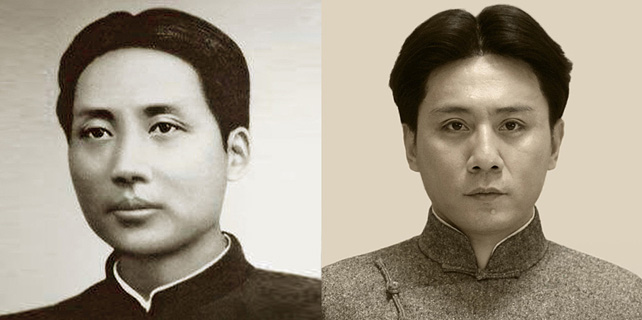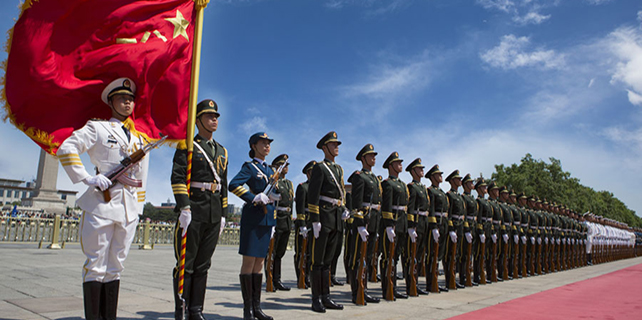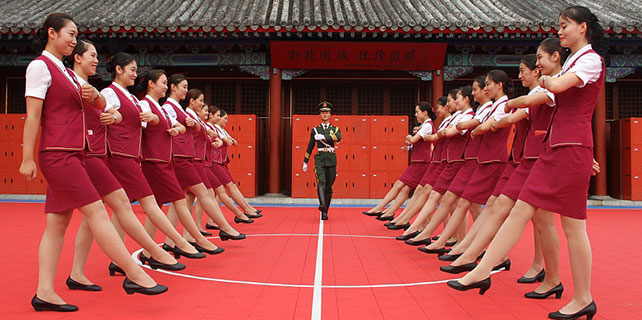Prudent leadership sails China through global economic turbulence
BEIJING - Data on China's first half-year economic performance released recently have prompted international monetary heavy weights and financial watchdogs to revise up prospects for its economy.
Analysts have attributed the country's sound economic development to its helmsman, the Chinese government empowered by the Communist Party of China (CPC).
Robust half-year growth
The International Monetary Fund (IMF) earlier this week revised up its annual growth for China by 0.1 and 0.2 percentage points respectively to 6.7 percent this year and 6.4 percent next year after China announced a 6.9-percent growth rate for the first six months.
The IMF said it based the third upgrading for China this year on its strong economic performance since the first quarter.
Both J.P. Morgan and Nomura revised China's 2017 growth up to 6.8 percent from 6.7 percent.
According to the Standard Chartered Bank, monthly data show China's seven prospective economic indexes have recently improved, indicating little likelihood of a slowdown in the coming months.
Citibank predicted China will accomplish strong growth in the second half despite a slight slowdown due to a large economic base.
The Asian Development Bank said the increase in both domestic consumption and foreign trade helped promote China's economic outlook. The situation came as a result of a steady rise in both personal income and public spending, a moderate recovery from 2016's low commodity prices, and an overseas market rebound.
It revised China's growth up to 6.7 percent this year and 6.4 percent next year, from 6.5 percent and 6.2 percent, respectively.
Effective government policies
"In my opinion the policy of the Chinese government has proven to be effective, a result from the base laid down two or three years ago," said Alexei Maslov, head of the Oriental Studies Department of the Russian Higher School of Economics Research University.
Maslov attributed China's steady economic growth firstly to gradual restructuring of the economy at the local level.
Secondly, the anti-corruption campaign has also played a key role. "It is estimated that even a partial victory over corruption may account for about 0.5 percent of GDP growth," Maslov said.
Maslov said the third reason is that China has begun to pay much more attention to the possible return of its investments abroad since 2017. In 2015 and 2016, there was a huge number of foreign investments, which were risky and did not achieve expected returns.
Maslov said other factors include a successful regulation of agriculture purchase prices and the closure of "zombie companies", i.e. inefficient enterprises which are basically bankrupt or are only kept alive by bank loans.
Finally, according to Maslov, foreign trade, which stagnated for a long time, is gradually recovering globally now.
"China's GDP growth in the past half year is another sign of recovery in the global economy and China's centrality to it, with strong trade performance helping to hold growth up," said Peter Drysdale, head of the East Asian Bureau of Economic Research and East Asia Forum at Australian National University.
China has witnessed strong foreign trade dynamics, an increase of almost 20 percent in the last six months, Maslov said.
The growth is the result of a number of factors, including China's adoption of new logistical flows, signing full or partial free trade agreements with a number of countries and the rapid development of e-commerce.
More efforts on deepening reform
China should "create a stable, fair, transparent and predictable business environment, and speed up efforts to build an open economy in a bid to promote the sustainable and healthy development of the Chinese economy," Chinese President Xi Jinping said at a meeting of the Central Leading Group on Finance and Economic Affairs on Monday.
"I think it's a good time for China to move ahead with economic reform because the economy is doing quite well and it's easier to reform in the good times than in the down cycle," said David Dollar, senior fellow at the Brookings Institution in Washington.
Drysdale said the Belt and Road Initiative and the anti-corruption campaign have illustrated the Chinese leadership's determination to push forward with reform, despite difficulties.
The challenge is to deliver the benefits of reform without pumping up the economy. That means continuing to prioritize reform over growth, he said.






















